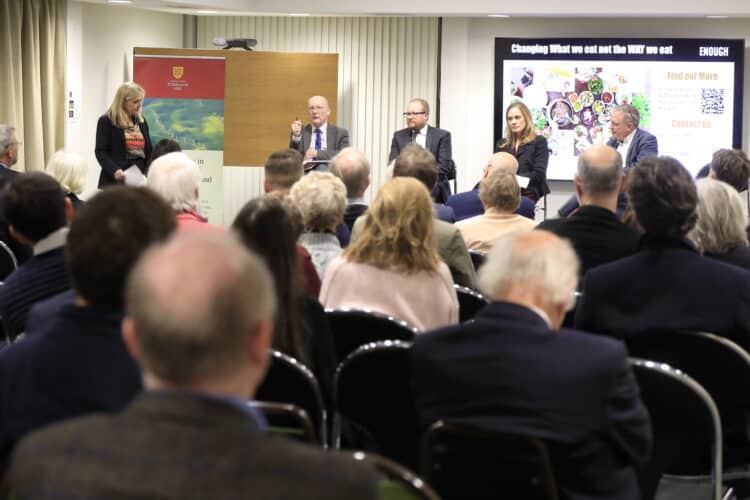Latest environmental sustainability seminar explores which protein source is best for the environment
28 Nov 2024

On Friday 15 November, the Hall hosted the fourth seminar in the “Conversations in Environmental Sustainability” series, with a discussion on “Lab-grown, real, or plant/fungi-based meat – which is best for the environment?”
Hosted by the Principal, Professor Baroness (Kathy) Willis, four guests gave brief presentations on the topic to an audience of around 90, followed by a lively panel discussion. The speakers included Professor Sir Charles Godfray, Professor of Population Biology and Director of the Oxford Martin School; Dr Ivan Wall, Co-Founder and CEO at Quest; Rose Dale from Rose Dale’s Organic Farm; and Jim Laird, Co-Founder and CEO at ENOUGH. The event was kindly sponsored by Ninety One.
The first presentation was delivered by Professor Sir Charles Godfray, whose research focuses on how the global food system will need to change and adapt to the challenges facing humanity in the 21st century. During his presentation, Charles outlined the following points:
- According to projections, demands on the planet to produce food will plateau – feeding the world in the face of climate change is the main challenge, and a full range of skills and technologies will be required to address it.
- If we do not decarbonise food production, by mid-century, projected food system emissions alone would push us towards a global increase of 2oC. We therefore have to radically rethink how we produce food and its effects on the environment.
- Most emissions in the food system are from livestock and this is a major contributor to greenhouse gases. There is a need to carefully think about how producers can transition to different methods of raising livestock and implement emissions mitigation in livestock-rearing. This is coupled with a need to eat less meat and reduce dairy consumption, with less but better being key.
- Another important component to meeting this challenge is the development of alternative sources of protein, for example, fungi-based and lab-grown food. At present it is difficult to collect data on the full environmental impact of these alternative proteins, especially across different scales of production.
- There remains some consumer resistance to alternative proteins but we are already seeing a number of large companies replacing meat/dairy products with plant-based alternatives.
- Many of these issues have become politicised but the facts about climate change and the need for healthy diets are not going away and need to be addressed.
Next, Dr Ivan Wall provided an introduction to cultivated meat and Quest’s mission for affordable, scalable and sustainable products:
- Quest is a B2B company which is tackling the major problems for cultivated meat, especially around scale of production and cost.
- According to Quest, the main global problem we are facing is an increase in meat consumption to unsustainable levels: 300 million tonnes of meat are produced annually and demand is set to increase by 73% by 2050 as the global population exceeds 9 billion.
- Cultivated meat is an emerging solution for meat production whereby cells are taken from animals entering the food chain and are subsequently grown in a way that produces meat products. These products ultimately intend to replicate the taste, texture and nutritional profile of conventional meats, without the environmental damage.
- The main limitations of cultivated meat are scale-up and cost-effectiveness. For example, meat cells do not naturally grow in suspension so edible “scaffolding” is required that enables suspension culture.
- To overcome this challenge, Quest has developed food-grade, edible micro-carriers which provide the building blocks for production of low-cost and sustainable meat. This solution also provides full traceability for food safety and labelling, and it is highly scalable.
- Overall, the industry is growing, with more than 170 companies working on different solutions, but it is still nascent and they share the common challenges of reducing cost, increasing scale and getting to market as quickly as possible.
Rose Dale presented next, introducing her farm and livestock, and comparing it with local examples of conventional/non-organic farming:
- Rose Dale’s Organic Farm has been in the family for over 60 years and, when taking over the farm in 2019, Rose was determined to continue managing it in an environmentally-friendly and sustainable way, with a focus on creating and preserving spaces for wildlife and biodiversity to flourish, and capturing carbon in the plants and the soil.
- At present, the majority of British beef is produced in feedlots, where animals live in cramped conditions and are typically fed an annual crop, such as maize. Eating ruminant meat does not require growing an annual crop and doing so involves tillage, causing soil carbon oxidation and soil damage, and/or the use of glyphosate, which also damages soil. Additionally, most annual crop production relies heavily on artificial nitrates, which have a very high carbon footprint, and the use of pesticides, causing damage to aquatic and water systems, as well as a depletion in the nutrients available in the soil. Replacement meat products require the use of annual crops to produce them thereby undermining their true sustainability.
- Combined, responsible farming and animal husbandry – with high animal welfare at its centre – and good stewardship of the land offer a more sustainable approach to farming which can address many of these challenges, including delivering food sources that are richer in nutrients and improving biodiversity. For example, when properly farmed, livestock can inject life back into tired soil and reinvigorate it as herbivorous animals cycle carbon and help to fertilise the soil. This approach can also help to tackle the loss of biodiversity found on farms which use pesticides and fertilisers.
- At present, Rose’s farm employs many sustainable and regenerative farming methods, including developing river meadows to create wetlands for wildlife, making annual hay cuts to improve grassland biodiversity, and planting native shrubs, trees and hedges.
Lastly, Jim Laird, Co-Founder and CEO at ENOUGH, championed fungi-based products as a powerful solution in the essential protein transition:
- A transition in essential proteins is urgent, feasible and currently taking place too slowly. The aim should not be to eliminate animal-based protein, but to meet future protein demand without breaching environmental boundaries. Essentially, relying solely on traditional animal agriculture is incompatible with our climate goals.
- Alternative proteins, including fungi-based options, provide a crucial alternative that can meet protein demand without straining natural resources. Fungi-based foods – foods derived from mycoprotein, mushrooms and other fungal sources – are one of the most promising solutions in this area. They are efficient to make and nutritious.
- The transition in essential protein will happen once consumers are given products that sufficiently meet their expectations around taste and texture, provenance, and cost.
- ENOUGH follows a B2B strategy supplying ABUNDA mycoprotein, which can be incorporated as a protein and fibre-rich ingredient in established recipes or used to inspire new culinary creations. The process for growing ABUNDA uses a continuous fermentation process which converts sugar into the whole biomass of fungi.
- It is supplied from a facility in the Netherlands which can grow 1.3 tonnes per hour, helping to meet the critical need for vast market scale. It also generates a fraction of the emissions associated with poultry farming, for example, and requires a low-water input to manufacture.
After the panel discussion and drinks reception, the Principal was joined by the speakers and guests for dinner in the Old Dining Hall, during which discussion and debate continued. Diners enjoyed a menu devised by the Hall’s Executive Head Chef, Sam White, which incorporated a range of ingredients produced via the OxFarmToFork short food supply chain initiative:
- Homemade caramelised onion focaccia, balsamic and olive oil butter
- Mixed beetroot carpaccio, crispy Nettlebed Bix cheese, beet gel, candied walnuts, micro kohlrabi
- Bruen Farm venison loin, venison suet pie, roast garlic potato puree, celeriac puree, sauteed rainbow chard, jus
- Salt-baked celeriac steak, cannellini bean stuffing, roast garlic potato puree, celeriac puree, sauteed rainbow chard, jus
- Apple terrine, pear sorbet, crème anglaise.
Pictures from the event can be accessed via our online media gallery.
Categories
Related News

